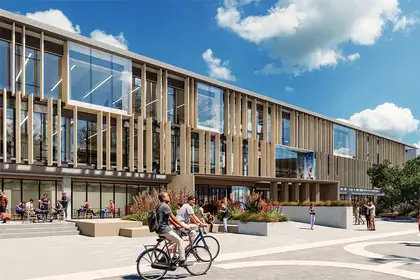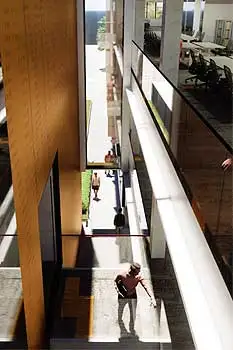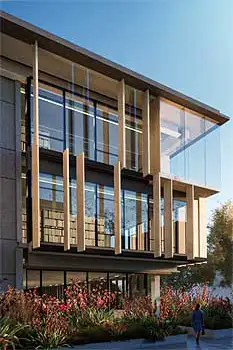
A concept design image of the refurbished Manawatū Library.
Massey University’s Manawatū campus library is set for a makeover with the launch of a major refurbishment project.
The project will seismically strengthen the building and transform the library into a welcoming, vibrant and modern learning space with a particular focus on providing more flexible spaces for individual and collaborative study.
Renowned architects Warren and Mahoney, whose previous works include Auckland’s recently opened shopping precinct Commercial Bay and projects for the University of Sydney, La Trobe University in Melbourne, University of Auckland and the student central building on Massey’s Auckland campus, are providing architectural services, alongside BECA, who will provide structural and building services, and AECOM for cost management services.
The project has moved from the concept to preliminary design phase, and the design process is expected to take around 15 months. Construction is anticipated to commence early 2022 and will take approximately 30 months to complete.
Changes to teaching and learning, along with changes in assessment resulting from the COVID-19 disruptions this year, have influenced the design of the space to ensure it supports blended learning as well as continuing to ensure library staff are providing both in-person and online services.

A concept design image of the refurbished library.
Design process
The design process has involved consultation with a range of library users, including students and staff, as well as mana whenua and the Deputy Vice-Chancellor Māori. A student survey elicited 900 responses and a project student group have provided in-depth feedback to the project, highlighting the need for better study and group meeting spaces. A staff survey showed that staff use the library less frequently but are more likely to access the library to view and borrow books.
Deputy Vice-Chancellor Maori Professor Meihana Durie has been facilitating the development of a cultural narrative for the library project which Warren and Mahoney have incorporated into the concept design. The design acknowledges the place of the Rangitāne o Manawatū (Rangitāne) iwi who hold the mantle of mana whenua across the wider Te Papaioea (Palmerston North) area.
There are six principles guiding the design:
- Mātauranga Embedded– an authentic expression of Te Ao Māori
- The Value of Time– an enduring space that stands the test of time
- Transformative Experience– a place for inspiration and meaningful learning, research and engagement
- A Liveable Campus– a welcoming and safe gateway to the campus’s heart and central home of informal learning
- Integrated Connection– encouraging collaboration
- Celebrate Identity– expresses and celebrates Massey’s past and its future, its location in Aotearoa and on the global stage.

A concept design image of the refurbished library.
A welcoming, inspiring and vibrant space
Provost Professor Giselle Byrnes, who is responsible for the university’s libraries and serves as the project sponsor, says it is critical that students, staff and others who use the library have been involved from the outset, to ensure a fit-for-purpose space is designed.
“The refurbishment of the Manawatū library will see us create a welcoming, inspiring and vibrant space that reflects Massey University’s culture of excellence and innovation in the 21st century, and provides users with the information, tools and expert assistance to facilitate research and learning,” she says.
“Once finished, we want the library to be recognised as the ‘heart’ of the Manawatū campus for people, whether staff, students, researchers or visitors seeking to engage in individual study, collaborative work, accessing information, using rich media and interactive technology or developing digital and information literacy skills.”
Professor Byrnes says the need to refurbish the library is borne out of the age of the building, and the need to strengthen it to improve the building’s seismic performance and extend its life. The building was originally built in 1968 and then extended in 1985. “Since this time, there have been major changes to the ways in which universities and library services operate, both digitally and on campus, and the original building layout and design no longer meets our needs. So while the structural strengthening aspect is a big driver of this refurbishment, we are also taking the opportunity to transform the library and ensure it is well and truly future-proofed.”
The project is being funded as part of the University’s 10-year capital plan. The Massey University Council approved the business case in 2019 and, following recent budgetary reconsiderations, the overall budget for the project, including seismic strengthening works, is now in the order of $58.5m.
University Librarian Linda Palmer says the modern academic library is no longer primarily a storehouse for physical items. “These days we think of it more as a learning and research commons, where people can work individually or collaboratively in environments that are purposefully designed for books, information technology and all forms of published information, with expert help and assistance when they need it. We need to better balance the space for books and the space for people, with the user experience at the centre of the design.”
Refurbishment
As part of the refurbishment some books will be moved out of the library into a storage facility where they will be able to be accessed by ordering through the library or online. Ms Palmer says using the responsive delivery service for ordering library material will be a change to how some people currently use the library. “We are conscious of this, and the future arrangement of collections will form a big part of our discussions with users during the design phase. There has always been a portion of the collection in storage and our online students already enjoy our responsive delivery service, which will be extended to all borrowers.”
The refurbishment will be done in stages, with some areas of the library closed while construction is undertaken. Alternate study spaces on campus will be provided when noisy works are required and works will be staged around important dates within the University calendar, avoiding exam periods for example.
Project updates will be provided to staff and students as the project progresses.